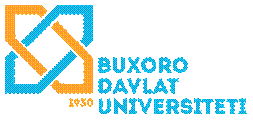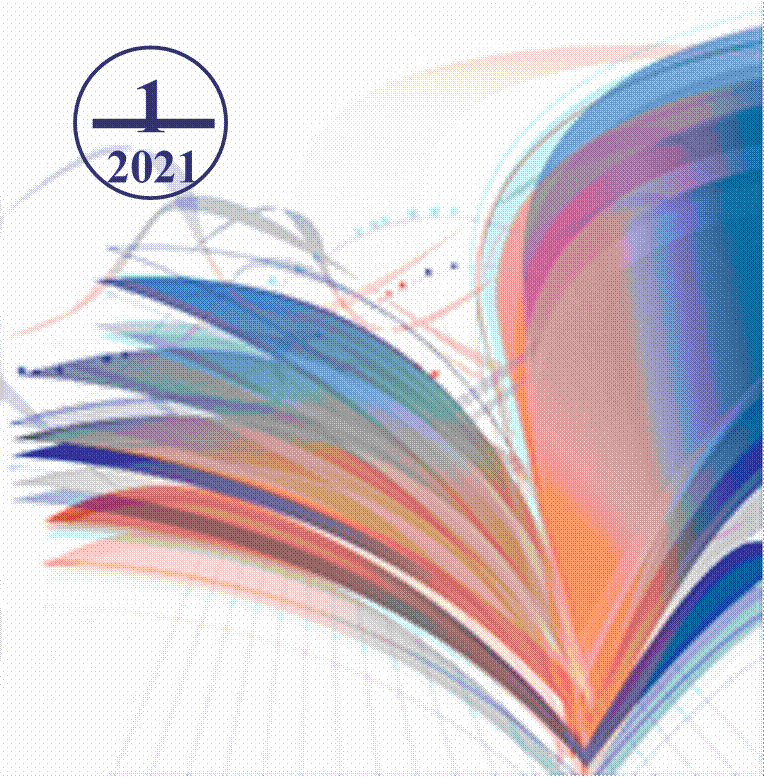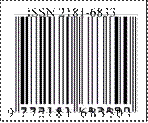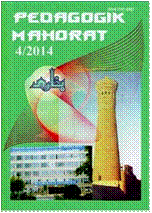


 PEDAGOGIK
ISSN
2181-6833 MAHORAT
PEDAGOGIK
ISSN
2181-6833 MAHORAT
1 (77) 2021 PEDAGOGIK MAHORAT
ISSN 2181-6883
PEDAGOGIK MAHORAT
Ilmiy-nazariy va metodik jurnal
1-son (2021-yil, fevral)
Jurnal 2001-yildan chiqa boshlagan
Buxoro – 2021
1
PEDAGOGIK MAHORAT
Ilmiy-nazariy va metodik jurnal
2021, № 1
 Jurnal Oʻzbekiston
Respublikasi Vazirlar Mahkamasi huzuridagi OAK Rayosatining 2016-yil
29-dekabrdagi qarori bilan pedagogika va psixologiya
fanlari boʻyicha dissertatsiya ishlari natijalari
yuzasidan ilmiy maqolalar chop etilishi lozim boʻlgan
zaruruiynashrlar roʻyxatiga kiritilgan.
Jurnal Oʻzbekiston
Respublikasi Vazirlar Mahkamasi huzuridagi OAK Rayosatining 2016-yil
29-dekabrdagi qarori bilan pedagogika va psixologiya
fanlari boʻyicha dissertatsiya ishlari natijalari
yuzasidan ilmiy maqolalar chop etilishi lozim boʻlgan
zaruruiynashrlar roʻyxatiga kiritilgan.
Jurnal 2001-yilda tashkil etilgan.
Jurnal 1 yilda 6 marta chiqadi.
Jurnal Oʻzbekiston matbuot va axborot agentligi Buxoro viloyat matbuot va axborot boshqarmasi tomonidan
2016-yil 22-fevral № 05-072-sonli guvohnoma bilan roʻyxatga olingan.
Tahririyat manzili: Oʻzbekiston Respublikasi,Buxoro shahri Muhammad Iqbol koʻchasi, 11-uy Elektron manzil: ped_mahorat@umail.uz
TAHRIR HAY’ATI:
Bosh muharrir: Adizov Baxtiyor Rahmonovich– pedagogika fanlari doktori, professor
Bosh muharrir oʻrinbosari: Navroʻz-zoda Baxtiyor Nigmatovich – iqtisodiyot fanlari doktori, professor Mas’ul kotib: Hamroyev Alijon Roʻziqulovich – pedagogika fanlari doktori, dotsent
Xamidov Obidjon Xafizovich, iqtisodiyot fanlari doktori
Begimqulov Uzoqboy Shoyimqulovich, pedagogika fanlari doktori, professor
Mahmudov Mels Hasanovich, pedagogika fanlari doktori, professor
Ibragimov Xolboy Ibragimovich, pedagogika fanlari doktori, professor
Yanakiyeva Yelka Kirilova, pedagogika fanlari doktori, professor (N. Rilski nomidagi Janubiy-Gʻarbiy Universitet, Bolgariya)
Qahhorov Siddiq Qahhorovich, pedagogika fanlari doktori, professor
Mahmudova Muyassar, pedagogika fanlari doktori, professor
Barotov Sharif Ramazonovich, psixologiya fanlari doktori, professor
Jabborov Azim Meyliqulovich, psixologiya fanlari doktori, professor
Kozlov Vladimir Vasilyevich, psixologiya fanlari doktori, professor (Yaroslavl davlat universiteti, Rossiya)
Morogin Vladimir Grigoryevich, psixologiya fanlari doktori, professor (Xakassiya davlat universiteti, Rossiya)
Belobrikina Olga Alfonsasovna, psixologiya fanlari nomzodi,professor (Novosibirsk davlat pedagogika universiteti,
Rossiya)
Chudakova Vera Petrovna, psixologiya fanlari nomzodi (Ukraina pedagogika fanlari milliy akademiyasi, Ukraina)
Tadjixodjayev Zokirxoʻja Abdusattorovich, texnika fanlari doktori, professor
Amonov Muxtor Raxmatovich, texnika fanlari doktori, professor
Oʻrayeva Darmonoy Saidjonovna, filologiya fanlari doktori, professor
Axmedova Shoira Neʻmatovna, filologiya fanlari doktori, professor
Durdiyev Durdimurod Qalandarovich, fizika-matematika fanlari doktori, professor
Hayitov Shodmon Axmadovich, tarix fanlari doktori, professor
Toʻrayev Halim Hojiyevich, tarix fanlari doktori, professor
Mirzayev Shavkat Mustaqimovich, texnika fanlari doktori, professor
Mahmudov Nosir Mahmudovich, iqtisodiyot fanlari doktori, professor
Boʻtaboyev Muhammadjon Toʻychiyevich, iqtisod fanlari doktori, professor
Boʻriyev Sulaymon Boʻriyevich, biologiya fanlari doktori, professor
Olimov Shirinboy Sharopovich, pedagogika fanlari doktori, professor
Qiyamov Nishon Sodiqovich, pedagogika fanlari doktori, professor
Qahhorov Otabek Siddiqovich, iqtisodiyot fanlari boʻyicha falsafa doktori (PhD), dotsent Qosimov Fayzullo Muhammedovich, pedagogika fanlari nomzodi, dotsent
Bafayev Muhiddin Muxammatovich, psixologiya fanlari boʻyicha falsafa doktori (PhD)
Jumayev Ulugʻbek Sattorovich, psixologiya fanlari nomzodi, dotsent
Umarov Baxshullo Joʻrayevich, pedagogika fanlari nomzodi, dotsent
Inoyatov Abdullo Shodiyevich, pedagogika fanlari boʻyicha falsafa doktori (PhD), dotsent
2
Гулноза СОБИРОВА. Инглиз тилини ўқитишда талабаларда нутқ фаолияти турларини таълимий
методлар асосида ривожлантириш ........................................................................................................... 145
ANIQ VA TABIIY FANLARNI OʻQITISH .................................................................................... 150
Шаҳло МЕРАЖОВА, Ҳилола ЭЛМУРАДОВА, Дилноза АЗИМОВА. Чегаравий шартлар бир жинсли
ва бир жинсли бўлмаган параболик типдаги тенглама учун биринчи аралаш масалани ечиш ........... 150 Ахат АХМЕДОВ. Развитие экспериментальной компетентности учителя физики на лабораторных
занятиях ...................................................................................................................................................... 157
Набия ТУРАЕВА, Жахонгир ТУРАЕВ. Методические рекомендации по обучению будущих учителей
математики конструированию и анализу урока ....................................................................................... 160
Gʻolib JUMAQULOV. Oʻquvchilar intellektual sifatlarini tarbiyalash texnologiyalari ............................... 163 Nazokat SAYIDOVA, Ilhom JURAYEV. Make beautiful control buttons for a website in coreldraw vector
program ........................................................................................................................................................ 166
Мўмин ҚОДИРОВ, Эркин ВОХИДОВ. Умумтаълим мактаблари ва академик лицейларда физика
фанини масофавий таълим асосида ўқитиш масалалари хусусида ........................................................ 173
Дилноз РЎЗИЕВА. Олий таълимда физика ўқитишни тизимли ёндашув усулида ташкил қилиш ..... 178 Ҳамидахон ҚОДИРОВА. Умумий ўрта таълим физикасида “оптика” бўлимининг мазмун ва
моҳияти ....................................................................................................................................................... 182
Eliboy XUDOYBERDIYEV, Sevara HAMROYEVA. Yulduzlar evolutsiyasini kvant tasavvurlar nazariyasi
asosida oʻqitish metodikasi........................................................................................................................... 186
Mehrinigor RAUPOVA. Boʻlajak biologiya oʻqituvchisi kvazi-professional faoliyatini loyihalash usullari 189
Gulbahor AKBAROVA, Charos AMINJONOVA. Problems and methods of teaching the subject
“biology” ...................................................................................................................................................... 193
Хасан АВЕЗОВ, Бахтиёр ГАНИЕВ, Акобир ИЛХОМОВ, Гуляйра ХОЛИКОВА. Повышение
эффективности учебной деятельности студентов при изучении биоорганической химии в
дистанционном формате ............................................................................................................................ 197
Ekhtiyor ATOEV, Gulnoz GAFUROVA. Information files for didactic chemistry testing ......................... 200
IQTISODIYOT VA TURIZM ........................................................................................................... 203
Bobir ZOKIROV, О.Р.РАШИДОВ. Oʻzbekiston va Xitoy Xalq Respublikasi oʻrtasidagi diplomatik
munosabatlarning yangi bosqichi ................................................................................................................. 203 TASVIRIY SAN’AT VA MUSIQA TA’LIMI .................................................................................. 206
Қорёғди ЖУМАЕВ, Муҳиба Сулаймонова. Алишер Навоий ва ўзбек мўъжаз рангтасвир санъати
уйғониш даври ............................................................................................................................................ 206
Вилоят ТЎХСАНОВА, Наргиза РАФИЕВА. Амалий санъат асаларини таъмирлашда ашёлар
технологияси .............................................................................................................................................. 209
Олим КАРИМОВ. Мусиқа дарслари орқали ўқувчи ёшларда онг, миллий тафаккурни шакллантириш
воситалари .................................................................................................................................................. 213
Davron ROʻZIYEV. Milliy sozlarning tarixiy taraqqiyoti va ta’lim-tarbiyadagi roli ................................... 219
Саноқул ДЎСТОВ. Ўзбек миллий мусиқа созларининг пайдо бўлиш тарихи ...................................... 227 Рустам РАХИМОВ. Формирование музыкальных интересов и способностей и их выявление в
семье ............................................................................................................................................................ 232
JISMONIY MADANIYAT VA SPORT ........................................................................................... 235
Нодиржон КАМБАРОВ. Шарқ яккакурашларида баркамол шахс тарбиясининг устувор
йўналишлари .............................................................................................................................................. 235
Хусен САФОЕВ. Военно-патриотическое воспитание школьников как педагогическая проблема ... 240
Шерзод АБДУРАХМАНОВ. Военно-патриотическое воспитание молодежи в современных
условиях ...................................................................................................................................................... 244
Муҳсин ОЛИМОВ. Ўрта масофага югурувчиларнинг мусобақа олди тайёргарлик машғулотларини
режалаштириш ........................................................................................................................................... 248
Низом ТЎХТАБОЕВ. Болалар ва ўсмирлар спорт мактабларида шуғулланувчи ёш қиз болаларнинг
жисмоний тайёргарлиги динамикаси ........................................................................................................ 254
Раҳим ШУКУРОВ. Талаба – ёшларда соғлом турмуш маданиятини ривожлантириш, жисмоний
тарбия ва спорт муҳим восита сифатида .................................................................................................. 258
“Педагогик маҳорат” журнали учун мақолаларни расмийлаштириш талаблари .................................. 261
6
Bukhara Engineering and Technology Institute
associate Professor
Bukhara Engineering and Technology
Institute assistant
Methods of the shaping scholastic database is considered In article for use when undertaking the total checking on chemical discipline with use the computer technology and processing result analysis.
Key words: didactic material, information file, degree of difficulty, distractor, conceptual indicator, empirical indicator, subtest, test tasks.
В статье рассматриваются методы формирования учебной базы данных для использования при проведении тотальной проверки по химической дисциплине с использованием компьютерной технологии и обработки результатов анализа.
Ключевые слова: дидактический материал, информационный файл, степень сложности, дистрактор, концептуальный показатель, эмпирический показатель, субтест, тестовые задания.
Шакллантириш scholastic маълумотлар базаси усуллари компютер технологияси ва қайта ишлаш натижа таҳлил фойдаланиш билан кимёвий интизом бўйича умумий текшириш амалга қачон фойдаланиш учун мақола ҳисобланади.
Калит сўзлар: дидактик материал, ахборот файли, қийинчилик даражаси, дистрактор, концептуал кўрсаткич, эмперик кўрсаткич, субтест, тест вазифалари.
As you know, the preparation of didactic material for monitoring the achievement of learning goals and assessing the formation of knowledge, skills of students is a very painstaking and responsible task [1, p. 12; 2, p. 28].
The need to obtain an objective picture of the didactic process requires standardization of the testing procedure. This ensures reproducibility and comparability of the results, reduces the influence of various factors on the test results, reveals and investigates the individual characteristics of respondents, as well as develops methods for quantifying the effectiveness of test control, which will become especially important in connection with the upcoming introduction of state education standards [3, p. 31].
Monitoring the achievement of educational goals is carried out by presenting the student with test items that have a clearly defined diagnostic direction (identifying the level of assimilation, the nature of the student’s actions, the formation of abilities and skills to perform laboratory work, solve typical problems, etc.). A set of test tasks on a particular topic (task block) is called a text information file. In addition, students ’personal data, quality characteristics of test items: difficulty level, control time, accrued points for the“ correct ”answer or each of the distractors, etc. are used as information files of the training database (UBD). The main requirements for the content of the test items are their relevance to the learning objectives, the comprehensiveness of the scope of the tested training course, section or topic, and diagnostics.
The selection of diagnosed basic concepts, abilities and skills is carried out according to the standard program in the context of curricula and qualification characteristics (professiograms) of the future bachelor of science in a technological specialty.
The algorithm of actions in the formation of information files UBD, in our opinion, includes the following steps:
- A selection of didactic material on the topic under study.
- compilation of the graph – “tree” of educational elements on the topic. - definition of conceptual and empirical indicators.
- establishing the minimum required number of test tasks, their type, level of difficulty.
- development of subject test tasks of equivalent complexity in an amount of 1.5–2 times more, i.e. it is necessary to have a “margin of safety”, since during testing, screening of tasks occurs. - input of test tasks for each topic in the form of separate text files (subtests).
- edit text files in accordance with the software and methodological requirements for the organization of the structure and information retrieval.
- in the case of using the “electronic problem book” program, set the range of mutually agreed changes in the parameters included in the task conditions.
1 (77) 2021 PEDAGOGIK MAHORAT
- the results of pedagogical examination: the degree of difficulty and the control time for completing tasks, points awarded for the correct answer, etc., in a separate information file.
- write the name of information files in a separate file “imena” (for example, questions – “WP1”, the proposed answers to the test task – “OTW1”, credited points – “BALL”, a separate subtest "WPOTW11", etc.).
- enter the name of information files in the “body” of the program (in the reading procedure), determine the total number of tasks in the ind. variant and the number of tasks from individual blocks (subtests), reflecting the contents of a particular topic, section.
- Using the automatic task selection program, create individual options for a test survey.
As an example, let us consider the work of the INTEX program for the automated selection of chemistry options for students of engineering specialties.
GETTING STARTED THE “INTEX” PROGRAM:
After starting the program, the following actions are gradually performed: the date “A3 $; A2 $, A1 $, FF%” is entered, the name and purpose of the program are indicated, information about the student is entered: full name, specialty code and group number, option number , date of issue. After this, the randomization of the variable FF% occurs.
Next, the file “HIM1” is read, which is a block of questions and tasks for a separate section of the course, describes the size of the two-dimensional array C1 $ (3.20), in which 3 means the number of variables, 20 - the number of questions and tasks in this section. The dimensions of a two-dimensional array can vary depending on the size of the section (the number of lines in one task and the total number of tasks or questions) of the course. The file “HIM1” is launched and the file information is assigned to the variable C1 $ (1, I), C1 $ (2, I), C1 $ (3, I) in cycle I. Similarly, reading the files: “HIM2”), “HIM3”, “HIM4”, "HIM5", "HIM6", reflecting the content of individual sections of the course. Structuring the training course into large sections in the form of separate files makes the debugging of the program much easier, allows you to organize the search and replacement of tasks using text editors, i.e. operatively update their content.
A special place in the program is occupied by an automated selection of questions and tasks for a given option. For this purpose, the RND function inside each file “HIM1 - HIM6” is used.
Using the RND function, a random number is selected depending on the RANDOMIZE function
(FF%) with the initial generation for each value of the variable FF%. When calculating the expression INT (RND + 20 + 1), we will have an integer between 0 and 20. Depending on the size of the section of the problem, we can choose an integer between 0 and N (INT (RND + N + 1); where, N is the natural number not exceeding the total number of proposed tasks and questions). The INT (X) function assigns only the integer part of the variable X.
After that, the output and listing of questions and tasks of this option on the printer is provided.
A sequential access file “JREG” is formed (Table 1), in which all current information is automatically recorded. After closing the file, control is transferred to the second part of the program by the RUN operator – “MENU”. At the end of the program, the student is given a sheet of the control assignment, signed by the teacher (methodologist) of the department.
Table 1.
|
F. I. ABOUT . student |
Group code |
Var. №. |
The numbers of questions and tasks of this option |
Date of issue |
|
Makhmudov P. |
2–19 ООТ |
38 |
10, 26, 51, 70, 75, 108, 122, 141, 153 |
29.06. 20 |
|
Rakhmatov A. |
4–19 ООТ |
57 |
14, 35, 50, 67, 78, 112, 131, 140, 150 |
30.06. 20 |
The results of the written test are evaluated by the teacher and entered into the computer's memory for processing.
For computer testing, the selection of tasks, the preparation of individual options is similar, the main difference is that in this case it is necessary to take into account certain requirements and features of computer testing, observe ergonomic requirements for the design and delivery of test tasks.
The methodological features of software development include the following:
- when using large arrays of information and lack of operative memory of the computer, during the execution of the program, the RAM is cleared from previously used information;
- a modular principle in the formation of UBD information files and dividing the program into parts that are executed as independent procedures;
- repeated randomization of options (FF% + n), i.e. if this option is available in the registration journal, a new selection of questions and tasks is carried out, which eliminates their coincidence;
- the ability to automatically change the parameters in the conditions of each typical task (the principle of “electronic problem book”), which allows you to create a database of “Task”.
This software package makes up for the lack of educational literature, saves the student’s, teacher and student’s study time. In a matter of minutes, automated issuance and registration of individualized written examinations is carried out, the number mismatch and the content of the option, sometimes allowed by students, are eliminated.
The software package is easily adaptable and can be used in the automated management of the educational process.
Literature
1. Abdukadirov A. Fair method. // People’s education. 1994. №. 3-4. - P. 41–43.
2. Mikhaylychev EA, Norov Sh.K. Didactic tests in the system of multi-stage control of students ’enamels: - Bukhara, 2011. - 36 p.
3. Norov Sh.K., Niyazkhonov T.N., Majidov M.A. Control and testing programs with a timer and a log. // INFO. - 2007. - № 2. - S. 51–52.
4. Mikhaylychev E.A. Technology standardization of didactic tests. // Abstracts dokl. I scientific and technical conference Bukhara branch of TSTU, p.17 - 18.- Bukhara, 1993. - 31 p.
|
PEDAGOGIK MAHORAT
|
|
1 (77) 2021 |
 Buxoro davlat universiteti
muassisligidagi
Buxoro davlat universiteti
muassisligidagi
“PEDAGOGIK MAHORAT”
ilmiy-nazariy va metodik jurnali barcha ta’lim muassasalarini hamkorlikka chorlaydi.
Pedagoglarning sevimli nashriga aylanib ulgurgan “Pedagogik mahorat” jurnali maktab, kollej, institut va universitet pedagogik jamoasiga muhim qoʻllanma sifatida xizmat qilishi shubhasiz.
Mualliflar uchun eslatib oʻtamiz, maqola qoʻlyozmalari universitet tahririy-nashriyot boʻlimida qabul qilinadi.
Manzilimiz: Buxoro shahri, M.Iqbol koʻchasi 11-uy
Buxoro davlat universiteti, 1-bino 2-qavat, 208-xona
Tahririyat rekvizitlari:
Moliya vazirligi gʻaznachiligi
23402000000100001010
MB BB XKKM Toshkent sh. MFO 00014 INN 201504275
BuxDU 400110860064017950100079002
Pedagogik mahorat: rivojlanamiz va rivojlantiramiz!
Buxoro davlat universiteti nashri sahifalandi. Chop etish siJurnal tahririyat kompyuterida fati uchun
PEDAGOGIK
 MAHORAT Jurnal oliy oʻquv yurtlarining
professor- bosmaxona javobgar. oʻqituvchilari, ilmiy
tadqiqotchilar, ilmiy xodimlar, magistrantlar, talabalar, akademik Bosishga
ruxsat etildi 05.04.2021
MAHORAT Jurnal oliy oʻquv yurtlarining
professor- bosmaxona javobgar. oʻqituvchilari, ilmiy
tadqiqotchilar, ilmiy xodimlar, magistrantlar, talabalar, akademik Bosishga
ruxsat etildi 05.04.2021
Ilmiy-nazariy va metodik litsey va kasb-hunar kollejlari hamda maktab Bosmaxonaga topshirish vaqti
jurnal oʻqituvchilari, shuningdek, keng ommaga 08.04.2021
moʻljallangan. Qogʻoz bichimi: 60x84. 1/8 2021-yil 1-son (77) Tezkor bosma usulda bosildi.
Jurnalda nazariy, ilmiy-metodik, Shartli bosma tabogʻi – 20,6 muammoli maqolalar, fan va texnikaga oid Adadi – 100 nusxa yangiliklar, turli xabarlar chop etiladi. Buyurtma №90.
2001-yil iyul oyidan Bahosi kelishilgan narxda. chiqa boshlagan.
Nashr uchun mas’ul: “Sadriddin Salim Buxoriy”
Alijon HAMROYEV. MCHJ
OBUNA INDEKSI: Musahhih: Muhiddin BAFAYEV. bosmaxonasida chop etildi. 3070 Мuharrir: Oʻgʻiljon Olloqova Bosmaxona manzili: Buxoro shahri M.Iqbol koʻchasi 11-uy.
262
Материалы на данной страницы взяты из открытых источников либо размещены пользователем в соответствии с договором-офертой сайта. Вы можете сообщить о нарушении.